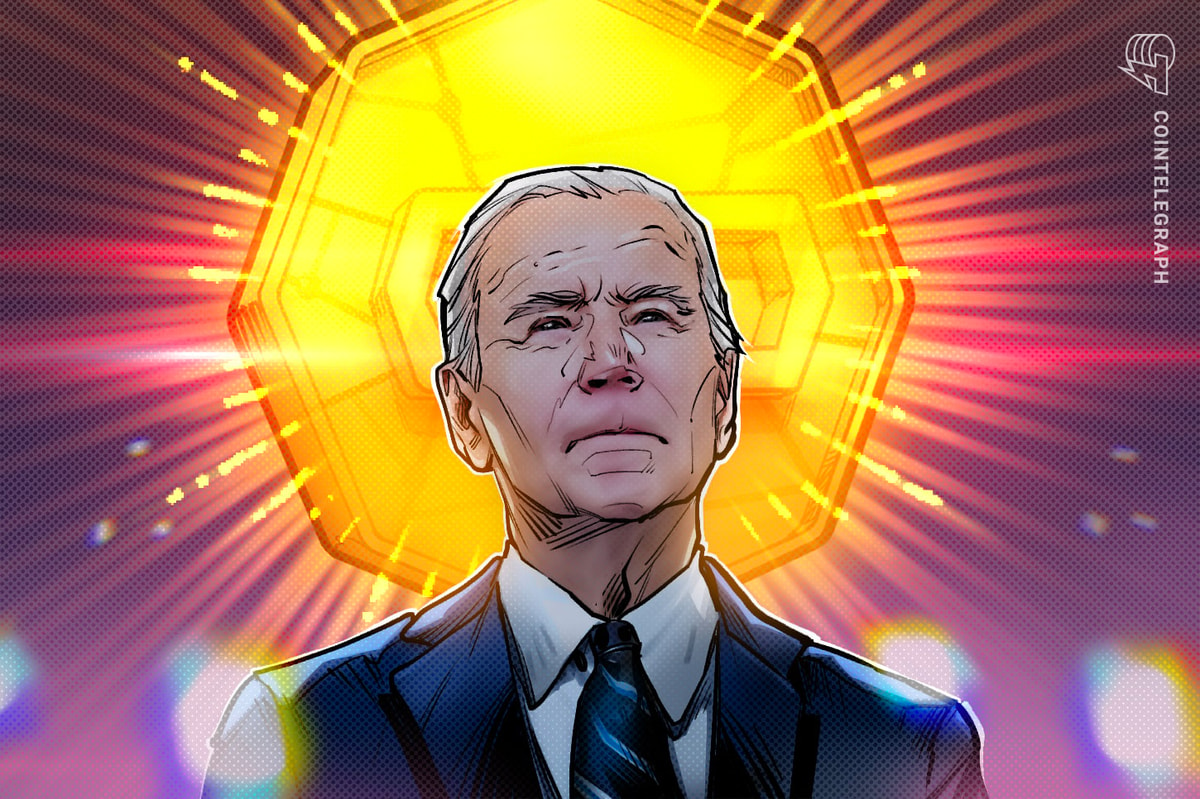Former United States President Joe Biden leaves behind a complicated cryptocurrency record.
Analysis
Former US President Joe Biden leaves office with a complicated cryptocurrency record spanning hardline regulatory crackdowns and big advances for institutional adoption.
On Jan. 20, pro-crypto President Donald Trump begins his presidential term. While Trump touts plans to make America “the world’s crypto capital,” Biden’s stance on crypto was more ambivalent.
Under Biden, a Democrat, US financial regulators brought dozens of lawsuits against industry companies for perceived legal infractions. On the other hand, they also paved the way for institutional adoption, approving numerous regulated crypto products and custodians.
The result for crypto was four years of uneven progress. Decentralized finance (DeFi) was effectively barred from the US market, and exchanges struggled. Meanwhile, spot crypto exchange-traded funds (ETFs), tokenized US Treasury bills and dollar-backed stablecoins proliferated.
Biden vs. Trump on crypto policy. Source: Galaxy Research
Regulatory crackdown
In 2021, Biden tapped Gary Gensler to chair the Securities and Exchange Commission, America’s top financial regulator. Gensler stepped down as SEC chair on Jan. 20, the start of Trump’s presidential term.
Under Gensler, the SEC — and its sister agency, the Commodity Futures Trading Commission (CFTC) — brought upward of 100 legal actions against crypto firms. Targets ranged from crypto exchange Coinbase to DeFi protocols Uniswap to infrastructure providers Consensys.
Gensler alleged the firms failed to register as securities brokers or exchanges, claiming this “deprived investors of significant protections, including inspection by the SEC, recordkeeping requirements, and safeguards against conflicts of interest, among others.”
Industry executives say the agency’s approach has “hamstrung our industry for years, limiting potential technological innovations and services,” Paul Grewal, Coinbase’s chief legal officer, said in a Jan. 17 post on the X platform.
In 2024, roughly 30 crypto executives accused Biden’s administration of working through regulators at the Federal Reserve and Federal Deposit Insurance Company (FDIC) to curtail access to banking services for crypto firms.
Galaxy Research rated Trump as more pro-crypto than Biden and his vice president, Kamala Harris, who ran against Trump in 2024.
Spot Bitcoin ETF assets broke $100 billion in November. Source: Eric Balchunas
Institutional adoption
Despite his administration’s tough enforcement stance, Biden also presided over crucial advances for institutional crypto adoption and real-world asset (RWAs) tokenization.
In January and July, respectively, the SEC approved upward of a dozen spot Bitcoin (BTC) and Ether (ETH) ETFs to list on the US market.
Since then, crypto ETFs have dominated the ETF landscape, with spot Bitcoin ETFs surpassing $100 billion in net assets in November. BlackRock, the world’s largest asset manager, now recommends up to a 2% portfolio allocation to the currency.
“The availability of digital assets in the ETF wrapper is definitely a game changer,” Will McGough, director of investments at Prime Capital Financial — a $24-billion registered investment adviser based in Overland Park, Kansas — told Cointelegraph in July.
“The ability to access these investments through regular investment channels will likely lead to greater adoption over time.”
Meanwhile, regulated digital asset custodians proliferated in the US during Biden’s tenure, with companies including Coinbase Custody Trust, Fidelity Digital Asset Services and Anchorage Digital Bank now authorized to custody assets for US clients.
Dozens of other crypto products also entered the fray, ranging from options contracts on spot Bitcoin ETFs to swaps and futures tied to memecoins such as Dogecoin (DOGE) and Bonk (BONK).
Tokenized US Treasury TVL expanded under Biden. Source: RWA.xyz
Tokenization
Progress wasn’t limited to traditional financial products, either. In 2021, asset manager Franklin Templeton launched the Franklin OnChain US Government Money Fund (FOBXX), a tokenized money fund initially launched on the Stellar network.
It marked the first time the SEC permitted an investment vehicle to rely on a blockchain network’s distributed ledger technology for recordkeeping.
Collectively, US tokenized money funds, including BlackRock USD Institutional Digital Liquidity Fund (BUIDL), now commands more than $3.5 billion in total value locked (TVL), according to RWA.xyz, a data service.
Meanwhile, USD Coin (USDC), a dollar-backed stablecoin regulated by the US Treasury Department, saw its TVL surge to approximately $45 billion under Biden.
In 2024, the US Treasury Department endorsed tokenization as “promis[ing] to unleash new economic arrangements and enhance efficiencies” and is now mulling tokenizing US Treasurys.
Meanwhile, the CFTC began exploring using cryptocurrencies as trading collateral for derivatives exchanges.
Related: Tokenization can transform US markets if Trump clears the way
This article first appeared at Cointelegraph.com News

